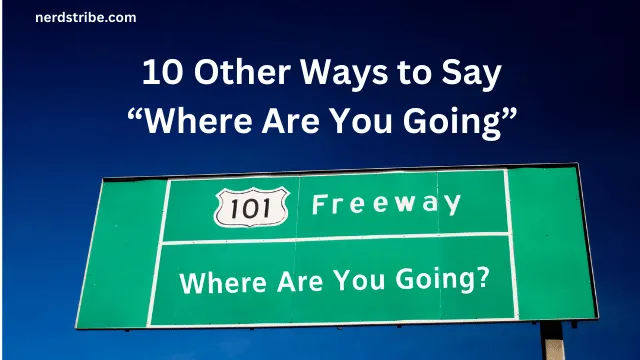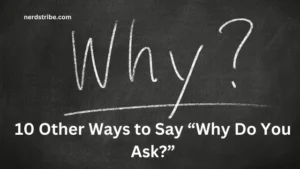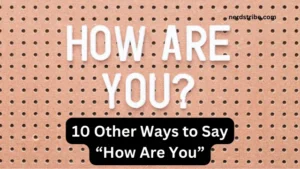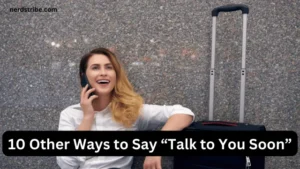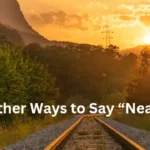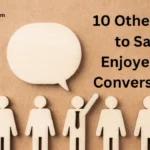Questions shape our interactions, often acting as bridges that connect us with others. Among the most common is the question, “Where are you going?” It’s simple, direct, and familiar, but it can also sound repetitive or uninspired.
What if you could ask the same question in ways that spark curiosity or add a personal touch? From casual chats with friends to professional scenarios, how you phrase your questions matters.
A fresh way of asking can make the conversation feel lighter, more engaging, and even culturally nuanced. Whether you’re texting a friend, chatting with a coworker, or striking up a conversation with a stranger, using alternative expressions can keep things lively.
In this blog post, we’ll explore 10 creative alternatives to “Where are you going?” These expressions will help you navigate different social settings, add flair to your conversations, and build connections in unique ways. Let’s dive in and make your words count!

Contents
- 1 1. “What’s Your Destination?”
- 2 2. “Heading Somewhere Special?”
- 3 3. “Off to an Adventure?”
- 4 4. “What’s the Plan?”
- 5 5. “Where Are You Headed?”
- 6 6. “Which Way Are You Headed?”
- 7 7. “Got Somewhere to Be?”
- 8 8. “What’s the Next Stop?”
- 9 9. “Where To Next?”
- 10 10. “Got Any Plans for the Road Ahead?”
- 11 Conclusion
- 12 FAQs
- 12.1 Why should I use alternatives to “Where are you going?”
- 12.2 Which phrase is best for professional situations?
- 12.3 Can I use these alternatives in written communication?
- 12.4 Are these alternatives culturally appropriate?
- 12.5 How can I choose the right phrase?
- 12.6 Do these alternatives add value to conversations?
- 12.7
1. “What’s Your Destination?”
A polished and formal way to ask about someone’s plans.
- Key Meaning: Directly inquires about their intended location.
- Usage: Perfect for professional or polite conversations.
- Example: “What’s your destination for the weekend trip?”
- Why It’s Effective: It’s respectful and avoids sounding too casual.
2. “Heading Somewhere Special?”
A phrase that adds curiosity and excitement.
- Key Meaning: Suggests interest in their plans without being intrusive.
- Usage: Great for conversations with friends or acquaintances.
- Example: “Heading somewhere special for lunch?”
- Why It’s Effective: It shows genuine interest and warmth.
3. “Off to an Adventure?”
A playful and engaging alternative.
- Key Meaning: Implies that the person might be going somewhere fun.
- Usage: Best for lighthearted, informal chats.
- Example: “Off to an adventure this evening?”
- Why It’s Effective: It adds excitement and a positive tone to the conversation.
4. “What’s the Plan?”
A casual and versatile option.
- Key Meaning: Asks about both destination and purpose.
- Usage: Suitable for both personal and casual professional settings.
- Example: “What’s the plan after work today?”
- Why It’s Effective: It’s short, relatable, and open-ended.
5. “Where Are You Headed?”
A simple and slightly modern take on the original question.
- Key Meaning: Asks for the destination in a conversational tone.
- Usage: Can be used with anyone, in any context.
- Example: “Where are you headed this afternoon?”
- Why It’s Effective: It’s familiar yet refreshingly phrased.

6. “Which Way Are You Headed?”
Adds a directional spin to the inquiry.
- Key Meaning: Focuses on the direction rather than the exact destination.
- Usage: Useful in both casual and situational contexts.
- Example: “Which way are you headed after the meeting?”
- Why It’s Effective: It’s practical and can suit various conversations.
7. “Got Somewhere to Be?”
A friendly and relaxed phrase.
- Key Meaning: Suggests curiosity about their plans without sounding formal.
- Usage: Ideal for friends or informal conversations.
- Example: “You look in a hurry—got somewhere to be?”
- Why It’s Effective: It’s casual and engaging, making the conversation feel natural.
8. “What’s the Next Stop?”
A creative way to phrase the question.
- Key Meaning: Suggests an ongoing journey with multiple destinations.
- Usage: Works well during travel or event-based discussions.
- Example: “After this, what’s the next stop on your agenda?”
- Why It’s Effective: It adds a dynamic and conversational flow.
9. “Where To Next?”
Short and snappy, this phrase adds curiosity.
- Key Meaning: Implies movement and progress.
- Usage: Great for travel or event-related contexts.
- Example: “We’re done here. Where to next?”
- Why It’s Effective: It’s quick, easy to use, and open-ended.
10. “Got Any Plans for the Road Ahead?”
A thoughtful and broader take on the inquiry.
- Key Meaning: Asks about their general plans or future intentions.
- Usage: Best for deeper or meaningful conversations.
- Example: “Got any plans for the road ahead this weekend?”
- Why It’s Effective: It’s reflective and encourages detailed responses.
Conclusion
The way we frame our words can significantly influence how others perceive us. Replacing “Where are you going?” with creative alternatives not only enriches your communication but also adds personality and depth to conversations. From casual to professional interactions, these phrases offer versatility and help you connect better with others.
By choosing phrases like “What’s the plan?” or “Heading somewhere special?”, you show genuine interest and curiosity. These expressions create a positive atmosphere and make conversations more engaging. Language is a powerful tool—use it thoughtfully to leave a lasting impression.
So next time you’re about to ask someone where they’re headed, try out one of these alternatives. It might just make your conversation a little more memorable.
FAQs
Why should I use alternatives to “Where are you going?”
Using alternatives keeps conversations fresh, engaging, and adaptable to different contexts.
Which phrase is best for professional situations?
“What’s your destination?” or “Where are you headed?” work well in formal environments
Can I use these alternatives in written communication?
Yes! Phrases like “What’s the next stop?” are perfect for emails or casual texts.
Are these alternatives culturally appropriate?
Most of these phrases are universally understood, though regional contexts may vary slightly
How can I choose the right phrase?
Consider the relationship, context, and tone of the conversation before selecting an alternative.
Do these alternatives add value to conversations?
Yes, they make your interactions more thoughtful, engaging, and less monotonous.

